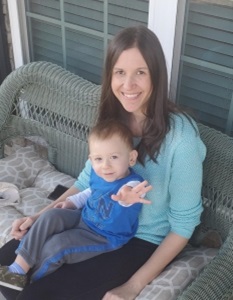A parent will do anything for their child. Even if it means giving the gift of life – for a second time.
Before he took his first breaths, Luke Brown had end-stage kidney disease. When his parents, Erin and Jeff, learned their newborn son needed a kidney transplant, it was a no-brainer: He’d get it from one of them, so long as they were a match.
At just a few days old, baby Luke’s kidneys were failing, so damaged they couldn’t clean his blood like they should. They were small and weak, but so was he – a long way from the 20-pound weight gain he’d need for a transplant.
Luke had some growing to do, but he had help getting there. Led by Donald “Jack” Weaver Jr., MD, a pediatric nephrologist at Atrium Health Levine Children’s, a team of kidney specialists helped Luke gain the total-body strength he’d need. This included dialysis, to keep his electrolytes stable and his blood clean; a feeding tube, for nutrition; and speech and physical therapy, to help with development.
“In order for these kids to thrive and to give them the care they deserve, they need a full team of people. Luckily, we have that, regardless what stage of chronic kidney disease a child has,” says Dr. Weaver.
After 2 and a half years of waiting, worrying and tracking Luke’s weight, the toddler was cleared for transplant. Though both his parents were matches, extensive testing of their blood and kidneys showed Erin’s organs would be most compatible. “It was an easy decision for me,” she says. “I wanted to do everything I could to give Luke his lifesaving treatment. The only thing I thought about was my son and giving him another chance at life.”
Finally, the wait’s over 
Hopeful. Nervous. Excited. Scared. Erin felt a little bit of everything in the days and minutes leading up to the transplant. She was reassured knowing she and Luke would be in the same place.
While Erin’s procedure was performed at Carolinas Medical Center and Luke’s at Levine Children’s Hospital, the facilities share the same Charlotte, NC, medical campus. This allowed mother and son to spend time together on the day of the transplant and give hugs and kisses before going their separate ways.
“Especially in this situation where a mom donated to her son, of course she’s going to want to see how he’s doing almost immediately. Having a transplant center here makes all of this possible,” explains Dr. Weaver.
After 2 and a half years, Jeff only had to wait a few more hours to get the news his family had long anticipated: The kidney transplant was successful for his wife and son, with Luke’s new kidney working right away. “It was a huge relief,” says Jeff, “just knowing that the whole process we’d been waiting for was finally over.”
The ultimate gift: a second chance at childhood
Kidney donation, especially from a parent, is what Dr. Weaver calls “the ultimate gift.”
“The fact that as a physician you’re even a small part of that is an amazing opportunity – it’s the reason we do what we do,” he says.
Since the transplant in September 2019, almost-3-year-old Luke is gaining weight, getting taller and has a newfound love for food, like pizza and popsicles. He plays sports and spends time with his family, including his role-model big sister.
Luke will be on immunosuppressive and antirejection medications for the rest of his life and will likely need another transplant when he’s older. But after years of waiting and worrying, the Browns are focused on being a family – and Luke gets to focus on being a kid.
Like many families, Erin and Jeff didn’t know much about transplants until their son needed one. Now they’re advocates in the transplant community, including for organizations like Donate Life America and Children’s Organ Transplant Association (COTA). They participate in charitable walks, attend outreach events and even share their story publicly.
One day, Luke might share his story, too. But for now, he’s healthy, thriving and living out the ultimate gift: a second chance at childhood, and at life.



